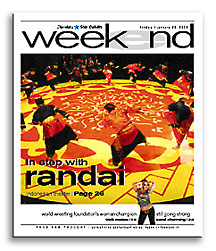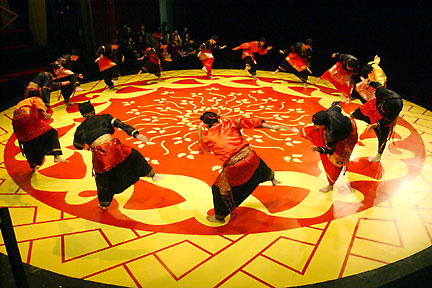

"Luck and Loss: Manandin's Gamble" will give viewers a chance to experience randai music...
Colorful Indonesian treat
The Kennedy Theatre stage comes alive this weekend with the colorful music and dance of randai -- and it couldn't have come at a more timely situation.
What started out as only the second time an adapted form of the popular Indonesian folk performance art has been done outside of its home culture has inadvertently turned into an indirect homage to the Southeast Asian area devastated by the December tsunami.
Homage to Tsunami victims"Luck and Loss: Manandin's Gamble"Where: Kennedy Theatre, University of Hawaii at Manoa When: 8 p.m. today, tomorrow, Thursday, and Feb. 4 and 5; 2 p.m. Feb. 6 Tickets: $15 general; $12 seniors, military, and UH faculty/staff; $10 non-UHM students; $3 UHM students with valid Spring 2005 UHM ID Info: 956-7655 or etickethawaii.com
|
It'll be a chance for all involved, both on stage and in the audience, to give back for the pleasure and privilege of experiencing this entertaining form of folk theater.
First done back in 2001 at the Kennedy Theatre, the German-born Pauka describes randai as "the traditional folk dance-drama of the Minangkabau people of West Sumatra, based on well-known folk tales, local musical traditions ... and the circular martial arts dance called dampeang."
At Monday night's rehearsal, one was immediately struck with the dance's visceral impact, based on the traditional martial arts of silek. The ensemble listened to leader (or goreh) Annie Lipscomb's short, loud commands in unifying the ensemble's stances and movement. They're punctuated by startlingly loud slaps on their stretched-out pants (called tapuak galembong) that become like drum heads under their hands. The combination of calls and sharp, percussive cloth "booms" contrasted to the quieter native music being played just off stage left.
With a simple yet striking stage design by Angela Price, the songs and dances complement the episodic and moralistic tale concerning the fate of a young man that journeys to a gambling tournament and loses everything in a cockfight. On top of that, he is later accused of stealing a water buffalo, and his only hope to reclaim his beloved fiancˇe and honor his family is through a stylized martial battle with the king.
Bleachers along the back of the stage -- which audience members will be encouraged to sit in -- simulates the village square experience, where randai is regularly performed throughout the country.

Singer Francis Mmana said that, what with the U.S.' generally confrontational attitude toward Muslims and Islam, "it's nice to have this voice of Indonesia that shows a peaceful aspect of the Muslim world ... and for us to help create this joyful voice."
"The students have enjoyed learning this form of theater," Pauka said. "It's been an in-depth experience that's rare for anyone outside of Indonesia, and really rewarding, according to the feedback I've been getting from them."
"I saw the other randai four years ago," said cast member Gregorson Rider, "and when I heard about this production, I was already interested in silek. So I approached it from that direction, and learned to mix it with the pencak (dance) here. It's a percussive, rhythmic dance, formed out of the martial art."
Several cast members have dual roles in any combination of dancer, actor and singer. The ensemble is always on stage.

On the cover: Dress rehearsal for "Luck and Loss: Manandin's Gamble" at the Kennedy Theatre at UH-Manoa.
[News] [Business] [Features] [Sports] [Editorial] [Do It Electric!]
[Classified Ads] [Search] [Subscribe] [Info] [Letter to Editor]
[Feedback]
